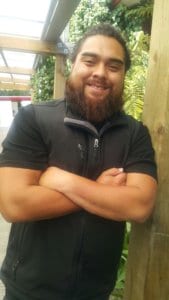Born and raised in Wellington, EIT lecturer Petera Hakiwai says his tūrangawaewae is definitely Hawke’s Bay.
Of Ngāti Kahungunu, Ngāti Porou, Rongowhakaata and Kāi Tahu descent, Petera moved here last year to teach te reo Māori and tikanga to second-year degree students. He has two children and lives with his uncle in Omāhu.
“I love being out there,” he says, “within walking distance of my marae. I’m reintegrating with what happens at my marae. I love everything about being back.”
Growing up, Petera and his family often holidayed in Hawke’s Bay and as a five-day boarder at Te Aute College he spent many weekends looking after his grandfather in Hastings.
His primary and intermediate education was total immersion and he started at Te Aute College imagining his fellow students would be equally fluent in te reo Māori.
“That wasn’t the case,” he says, “and I ended up being one of the top in my form. I thought this is going to be a bit of a breeze.
“I was surprisingly one of the top of the English class as well. The English teacher was really passionate about educating students and she was very uncompromising in setting a high bar.”
Petera went on to Victoria University, gaining a Bachelor of Arts (Honours) in Māori and te reo Māori.
His first career job was at Ngā Taonga Sound & Vision, where he helped catalogue the Māori collection.
“That largely consisted of me listening to content using earphones and summarising it in Māori as a resource for researchers and others.”
In 2011, he was invited to attend the prestigious Te Panekiretanga o te Reo and he travelled with other academy students to look at indigenous cultures in Ireland, Scotland, Wales, England, Spain and Hong Kong.
“I’ve also been to Bali, Fiji and Rarotonga and to Australia a couple of times. I’m kind of well-travelled now but I couldn’t live overseas for more than a year because I love this country so much.”
In 2014, Petera was chosen to speak on behalf of Kahungunu at the annual coronation of the Māori king.
“I was 22 at the time and the average age of speakers was 50 to 60. What the iwi was trying to show was that it is not afraid to have someone represent their marae and speak on behalf of their iwi if they are good enough.
“It was a very humbling experience.”
The 25-year-old loves working at Te Ūranga Waka, a position that also encompasses research.
“We are at a point with the revitalisation of te reo Māori where some people understand the need to expand the vocabulary” he says. “New words are coming out by the second in the English-speaking world.”
But there are also Māori words, he says, that haven’t been used for a long time.
“We are revitalising the words but some are saying we should make those words up. That’s the debate.
“The way I look at it you have to carry on doing your best and doing what you know. It’s good to listen to other people and take heed.
“But if you worry about what they are going to think your progression will be slow. You have got to have faith in what you are doing and do it for the right reasons.”

